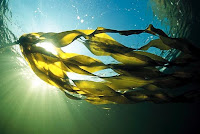FISHLESS OCEANS COULD BE A POSSIBILITY
OCEANS BECOME BARREN DESERTS BY 2050, SAYS UN
OCEANS BECOME BARREN DESERTS BY 2050, SAYS UN
 Discovery News - The world faces the nightmare possibility of fishless oceans by 2050 without fundamental restructuring of the fishing industry, UN experts said Monday. “If the various estimates we have received... come true, then we are in the situation where 40 years down the line we, effectively, are out of fish,” Pavan Sukhdev, head of the UN Environment Program's green economy initiative, told journalists in New York. A Green Economy report due later this year by UNEP and outside experts argues this disaster can be avoided if subsidies to fishing fleets are slashed and fish are given protected zones -- ultimately resulting in a thriving industry. The report, which was opened to preview Monday, also assesses how surging global demand in other key areas including energy and fresh water can be met while preventing ecological destruction around the planet.
Discovery News - The world faces the nightmare possibility of fishless oceans by 2050 without fundamental restructuring of the fishing industry, UN experts said Monday. “If the various estimates we have received... come true, then we are in the situation where 40 years down the line we, effectively, are out of fish,” Pavan Sukhdev, head of the UN Environment Program's green economy initiative, told journalists in New York. A Green Economy report due later this year by UNEP and outside experts argues this disaster can be avoided if subsidies to fishing fleets are slashed and fish are given protected zones -- ultimately resulting in a thriving industry. The report, which was opened to preview Monday, also assesses how surging global demand in other key areas including energy and fresh water can be met while preventing ecological destruction around the planet. One billion people, mostly from poorer countries, rely on fish as their main animal protein source, according to the UN. The Green Economy report estimates there are 35 million people fishing around the world on 20 million boats. About 170 million jobs depend directly or indirectly on the sector, bringing the total web of people financially linked to 520 million. According to the UN, 30 percent of fish stocks have already collapsed, meaning they yield less than 10 percent of their former potential, while virtually all fisheries risk running out of commercially viable catches by 2050. The main scourge, the UNEP report says, are government subsidies encouraging ever bigger fishing fleets chasing ever fewer fish - with little attempt to allow the fish populations to recover. Creating marine preservation areas to allow female fish to grow to full size, thereby hugely increasing their fertility, is one vital solution, the report says. Another is restructuring the fishing fleets to favor smaller boats.
One billion people, mostly from poorer countries, rely on fish as their main animal protein source, according to the UN. The Green Economy report estimates there are 35 million people fishing around the world on 20 million boats. About 170 million jobs depend directly or indirectly on the sector, bringing the total web of people financially linked to 520 million. According to the UN, 30 percent of fish stocks have already collapsed, meaning they yield less than 10 percent of their former potential, while virtually all fisheries risk running out of commercially viable catches by 2050. The main scourge, the UNEP report says, are government subsidies encouraging ever bigger fishing fleets chasing ever fewer fish - with little attempt to allow the fish populations to recover. Creating marine preservation areas to allow female fish to grow to full size, thereby hugely increasing their fertility, is one vital solution, the report says. Another is restructuring the fishing fleets to favor smaller boats. The greedy economic policies of the global fishing industry does not allow the recovery of fish stocks. Experts advise that the fishing fleets should cut down and enable fishing stocks recovering. Instead of eating so many fish, why not include in your diet sea vegetable food that float in huge seaweed mats?
The greedy economic policies of the global fishing industry does not allow the recovery of fish stocks. Experts advise that the fishing fleets should cut down and enable fishing stocks recovering. Instead of eating so many fish, why not include in your diet sea vegetable food that float in huge seaweed mats? WHAT DO THE VEDIC TEACHINGS TELL US?
 Passer-by: Good morning!
Passer-by: Good morning!Prabhupada: Good morning. Thank you. Hare Krishna. ... Oh! Big. ... The Japanese, they eat this seaweed.
Brahmananda: Yes.
Prabhupada: Yes. It is good for the fish-eaters, because it has got fishy taste, although it is vegetable. (pause) Those who are fish-eaters, even by smelling fish, fishy, they'll increase their appetite. Is it not?
Svarupa Damodara: Yes.
Prabhupada: It is containing protein. Taste is also. (pause) This seaweeds, all over the ocean. When passing ship, you can see. All over.
Śrīla A. C. Bhaktivedanta Swami Prabhupāda :
“Conversations - Morning Walk”
April 27, 1973, Los Angeles
Vedabase - 730427mw.la
“Conversations - Morning Walk”
April 27, 1973, Los Angeles
Vedabase - 730427mw.la
1 comment:
you write excellent commentary based on the main article.
Hare Krishna
Prasanth Jalasutram
Post a Comment